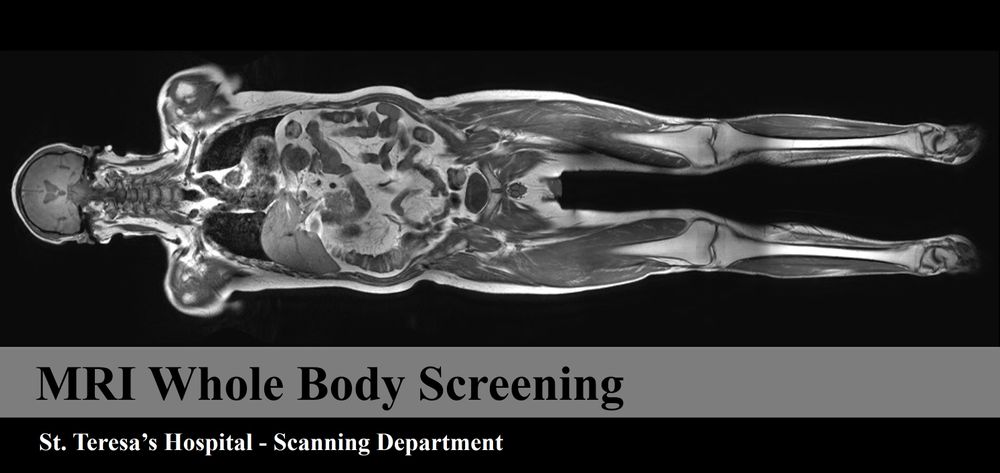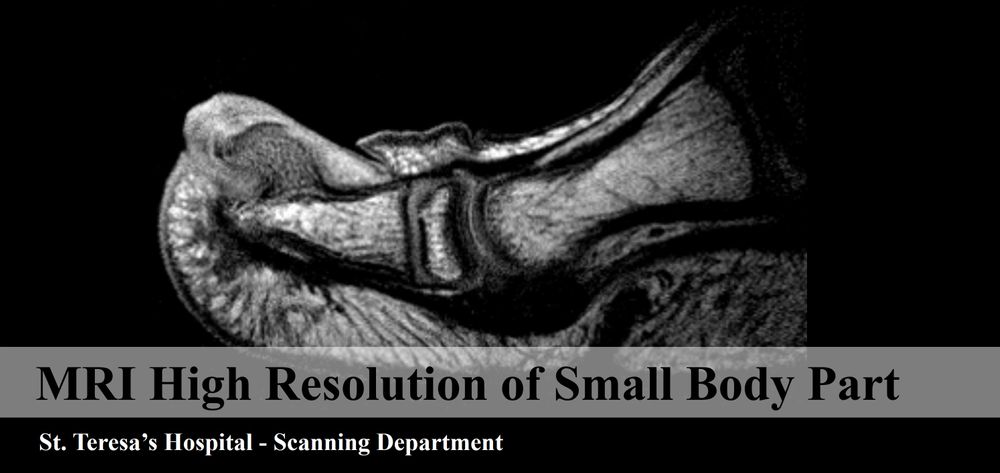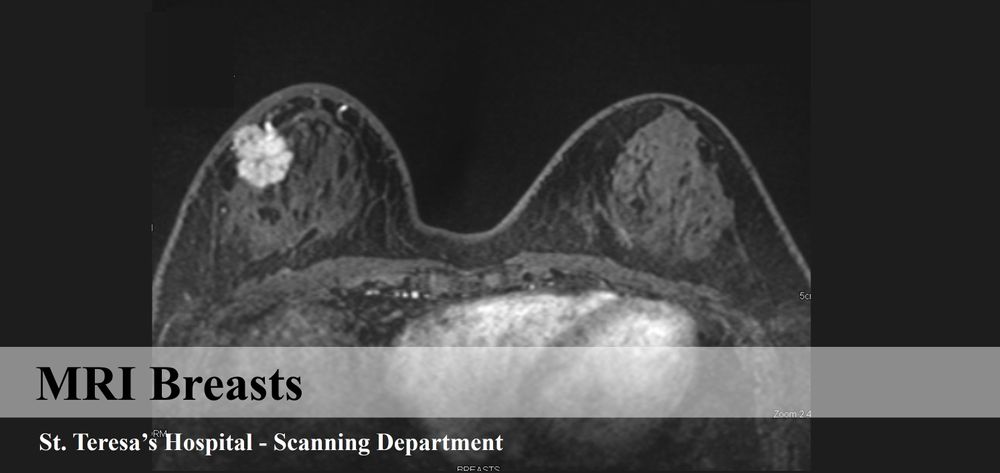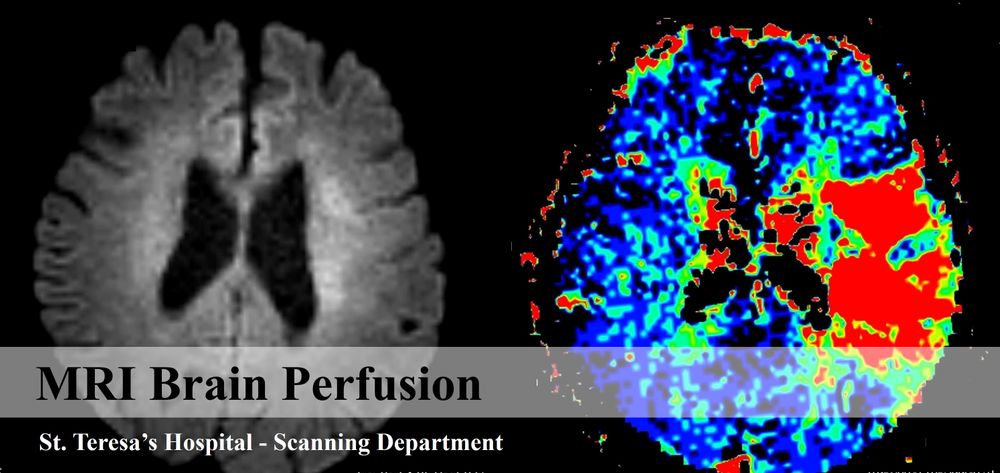MRI
What is Magnetic Resonance Imaging (MRI)?
MRI is a technique that utilizes strong magnetic field and radio waves to produce diagnostic images. The images provide detailed information of bone and soft tissues in the body. The examination is safe and radiation free with no known side effects.
MRI • Preparation & Procedure
PATIENT INFORMATION FOR MRI EXAM
General Information
- Eat and drink normally unless instructed otherwise.
- Take medications as usual unless instructed otherwise.
- Do not wear eye make-up, colored or cosmetic contact lenses.
- Please inform your doctor and our staff when making appointment for special exam arrangement:
- If you have any metallic implants or prosthesis e.g. cardiac pacemaker.
- If you are claustrophobic.
Information for exam with contrast injection
- Please inform your doctor and our staff if you have allergic history to gadolinium MRI contrast. Steroid cover before exam may be advised.
- If the exam requires patient to receive multiple doses of gadolinium MRI contrast, blood creatinine level should be checked within 2 weeks before exam.
Information for female of childbearing age
- Please inform your doctor and our staff if you are/may be pregnant or if you are breast-feeding before the exam.
- The date of your last menstrual period (LMP) will be asked for our record.
Information for infants / children (who require medication for sedation)
- Wake them up early on the day of exam.
- Please keep them awake 4 hours before exam.
- Fasting for 4 hours (except water) before exam (skipping 1 meal for infants).
Information for patients under the age of 18
- Need to be accompanied by parent or legal guardian for examination.
- The written consent form must be signed by parent or legal guardian.
- Please bring patient’s birth certificate or relevant identification document for registration.
REGISTRATION
- Arrive at Scanning Department at appointment schedule.
- Present the following documents to Front Desk for registration.
- Doctor’s referral letter
- Appointment Sheet (if any)
- Identification document, e.g. HKID card
- Previous imaging reports, DVDs and films (except those examinations completed in Scanning Department)
BEFORE MRI SCAN
- Meet our nurse / radiographer to review medical history, explain procedures and complete safety checklist e.g. any metallic implant or prosthesis, etc.
- Get changed into hospital gown and take off all personal possessions (e.g. watches, jewellery, hairpins, medicated patches, credit cards, etc.).
- This session takes about 15-30 mins before exam.
DURING MRI SCAN
- Entire scanning procedure is conducted by our well-trained radiographers.
- Put on earplugs / headphone given by our staff to minimize the noise during the scan.
- Lie on the scanner table and stay still throughout the exam.
- The table carries you slowly into the scanner gantry.
- Intercom system and call bell are available for communication.
- Intravenous contrast medium may be given if needed.
- Exam may last about 15 mins to 2 hours (depending on exam regions).
AFTER MRI SCAN
- If intravenous contrast is given in the exam, you may be asked to stay for about 20 mins for any adverse reactions.
- Resume your usual diet and activities unless your doctor advises you differently.
REPORT & FINDINGS
- Our radiologists interpret the images and issue an imaging report to your referring doctor.
- Your referring doctor explains the findings and diagnosis to you.
MRI • FAQ
Q: Is MRI Safe?
A: MRI is an imaging technique that employs a non-invasive strong magnetic field and radio waves to create images. Procedure is painless and does not involve any ionizing radiation. There is no known side effect.
However, there are safety concerns for the MRI environments. One should bear in mind that the magnetic field is ALWAYS ON. Metallic objects can be dangerous when they are being attracted by the strong magnetic field. It is necessary to take off all metallic possessions such as keys, watches, hairpins, earrings, etc. before entering the scan room. A safety checklist must be completed before starting a scan as safety measures.
Metallic implants or metallic foreign bodies also pose concerns on MRI safety. Please inform our staff if you have any metallic implants or prosthesis. Some common implants are listed as follows:
- Cardiac pacemaker/defibrillator
- Artificial heart valve
- Orthopedic prosthesis
- Cerebral aneurysm clips
- Neurostimulators
- Cochlear implants
- Newly placed orthopedics metallic implant or pin
Q: Is it safe to have MRI scan if I have denture or dental fillings?
A: MRI will not affect the dental fillings. However, metal components used in the dentures can influence the image quality. Therefore, removeable dentures should be taken away before exam.
Q: Do I need contrast injection for MRI examination?
A: Depending on the examination requested by your doctor and the clinical indications, you may be required to have contrast medium injection for more information. Our staff will discuss with you before a contrast enhanced study.
Q: Are there any side effects after contrast injection?
A: Gadolinium-based MRI contrast medium is a safe drug. Reactions are uncommon and usually very mild. Please inform your doctor and our staff if you have previous history of allergy to gadolinium-based MRI contrast medium before examination. Steroid cover on the day before contrast MRI examination may be advised.
- Mild reactions:
Minor reactions such as headache, dizziness, nausea or vomiting, might occur in about 1% of patients.
- Severe reactions:
Rarely! Gadolinium-based MRI contrast medium can cause severe reaction, such as convulsion, severe anaphylaxis and death, but is extremely rare. The chance of this fatal occurrence is about 1 in 400,000. For 1-7% of the patients with severely impaired renal function or on dialysis, gadolinium-based contrast media associated with nephrogenic systemic fibrosis and deaths have been reported. Fortunately, with the safety of the newest contrast media, these adverse effects are very rare.
Gadolinium may deposit in various structures of the brain following repeated injection of gadolinium-based MRI contrast media. To date, there is no proof that these gadolinium deposits in the brain have been associated with adverse health effects or pathological consequences.
Q: Can I have MRI scan if I am PREGNANT?
A: MRI is considered a safe test, and no ionizing radiation is involved. However, long term biological effects of MRI examination on fetus are still not fully understood. MRI imaging of pregnant patient is carried out only when the patient’s doctor has decided that the advantages of MRI outweigh the potential risks.
Please inform your doctor and our staff if you are or may be pregnant before the examination.
Q: Can I have MRI scan if I am BREAST-FEEDING?
A: Breast-feeding after the injection of Gadolinium-based MRI contrast medium is considered safe since only about 0.01% of the maternal Gadolinium dose is excreted into breast milk. Concerned mothers may discard milk for 24 hours after receiving contrast to avoid fetal exposure to contrast medium.
Q: Can I have MRI scan if I am CLAUSTROPHOBIA?
A: Most claustrophobic patients can still undergo an MRI examination with the assistance of our staff. An intercom system is available between patient and our staff for communication whilst an emergency call bell is also provided during the scan. Some patients may require mild sedation with medication prescribed by doctor. If needed, a family member is allowed to stay with the patient in the scan room throughout the examination after he/she is screened for metal on or in the body.
Q: Do I need to provide a requisition form from my doctor for an MRI scan?
A: Yes, a requisition form signed by your doctor will provide us with your necessary clinical information; and we will tailor the examination accordingly.
Q: Why do you need my previous X-Ray, CT, MRI and other imaging scans?
A: The more information that our radiologist has when he reviews your study, the more specific the interpretation will be. Correlations with other studies are often helpful.
Q: How will I get the MRI examination results?
A: After the MRI examination, our radiologist will interpret your scan and issue an imaging report to your doctor who will then explain the findings and diagnosis to you.









